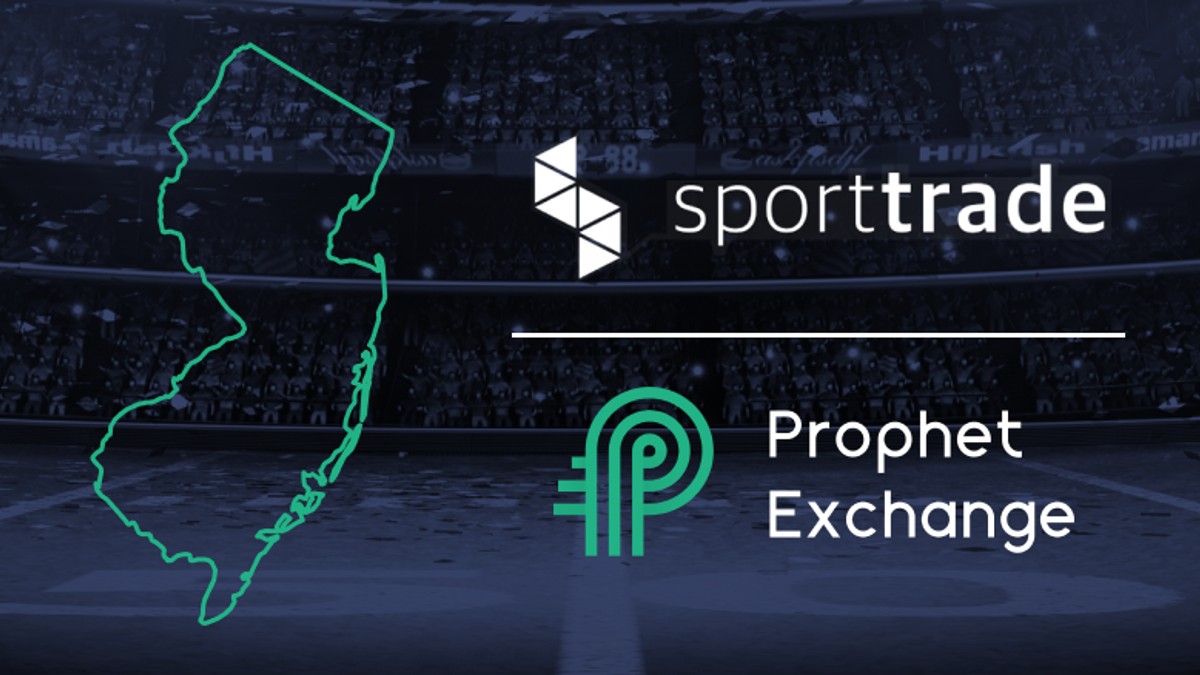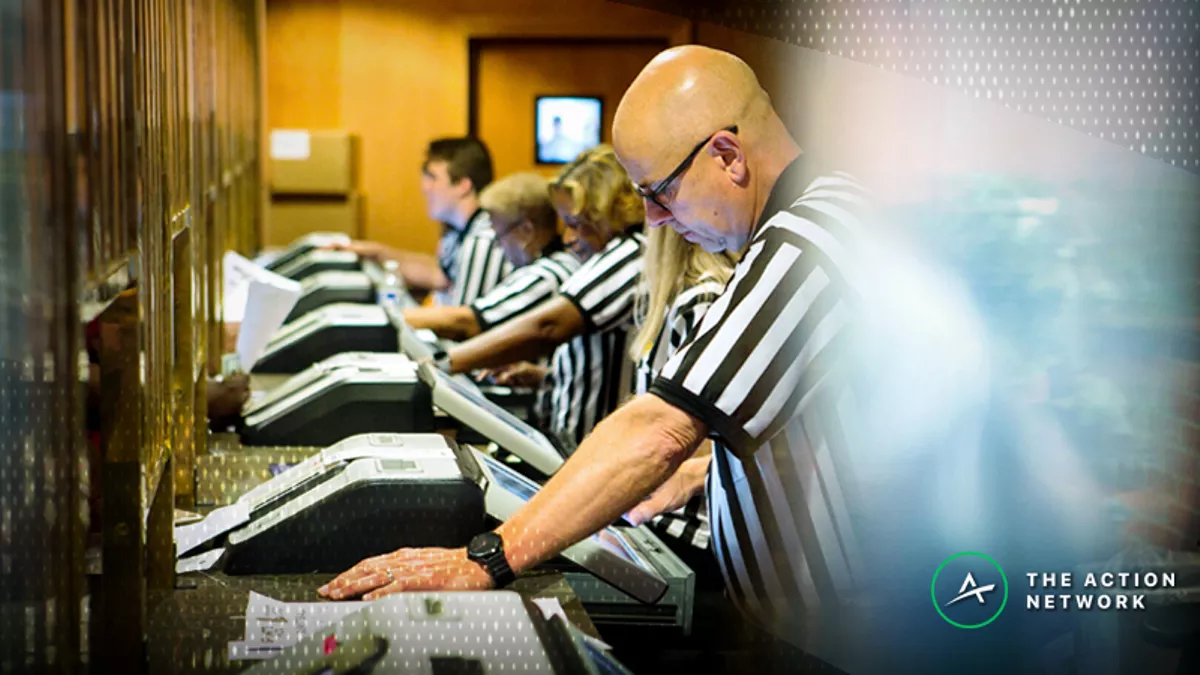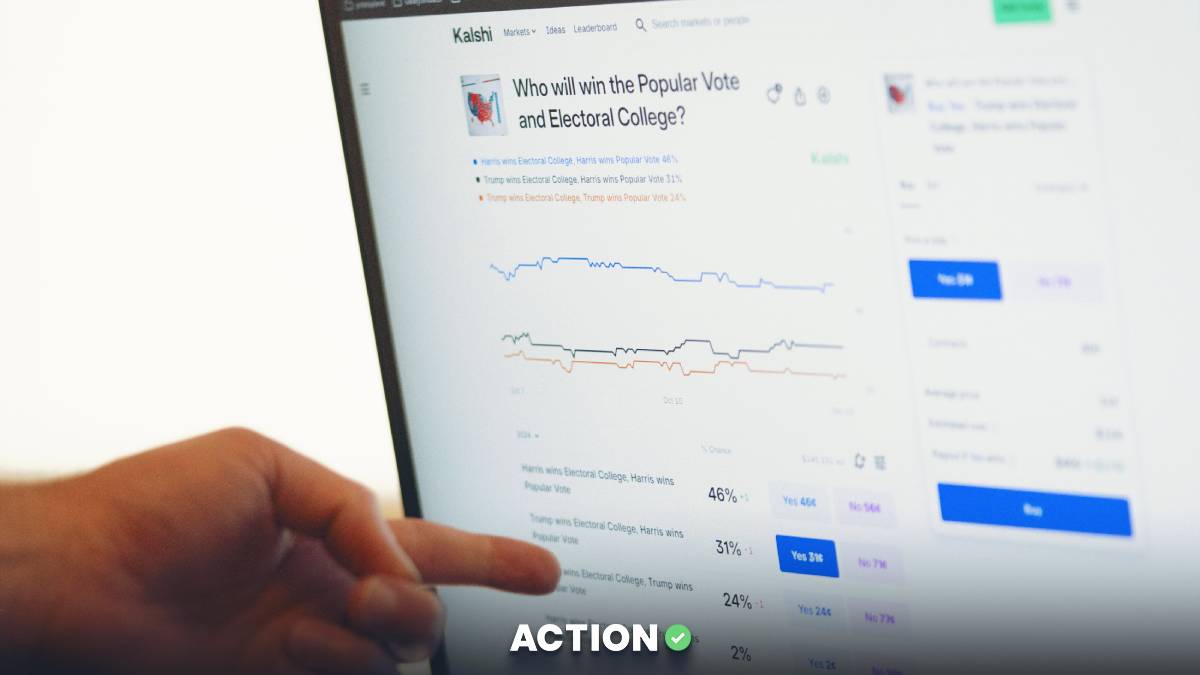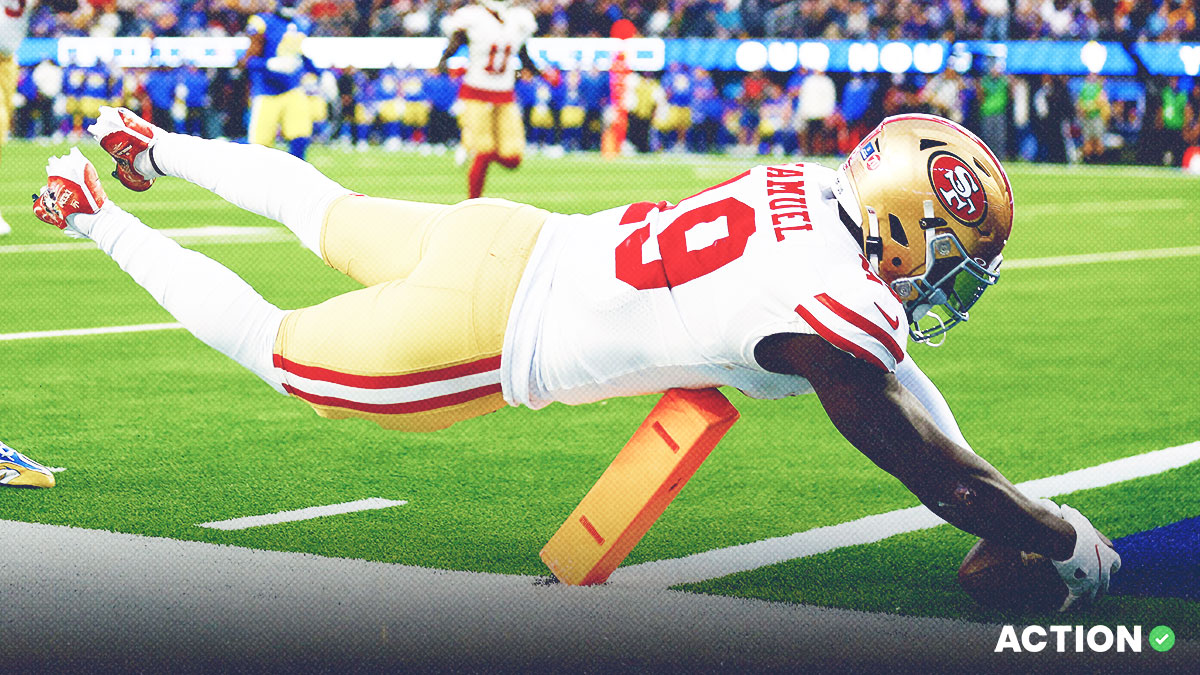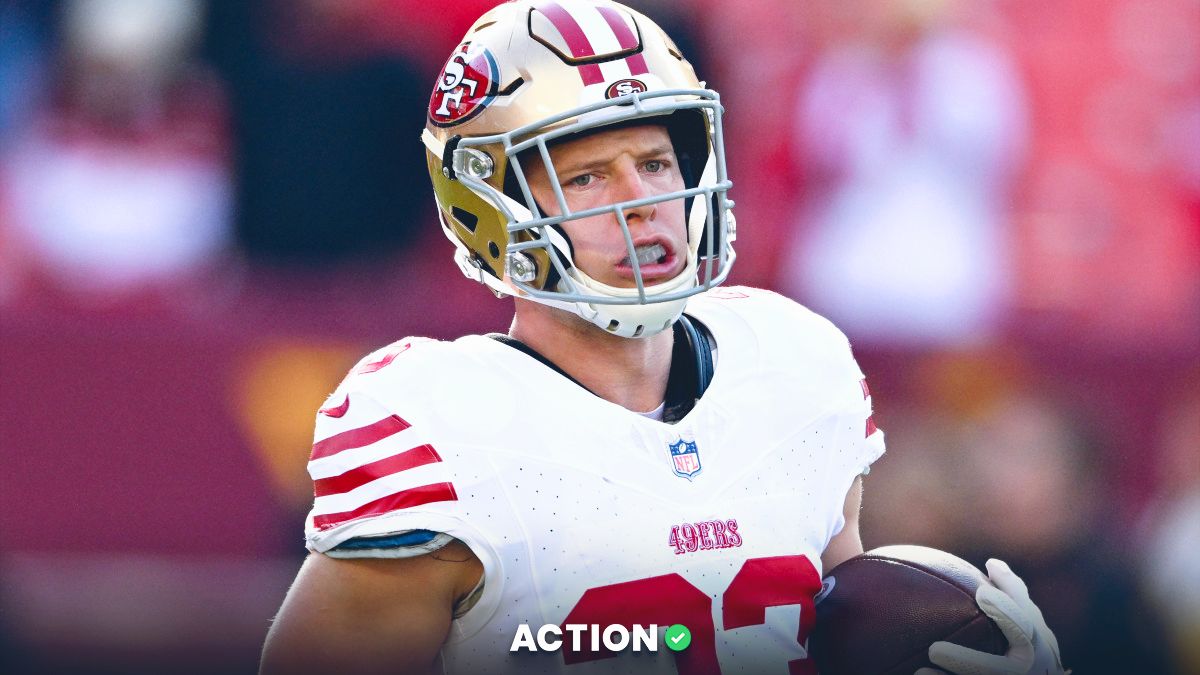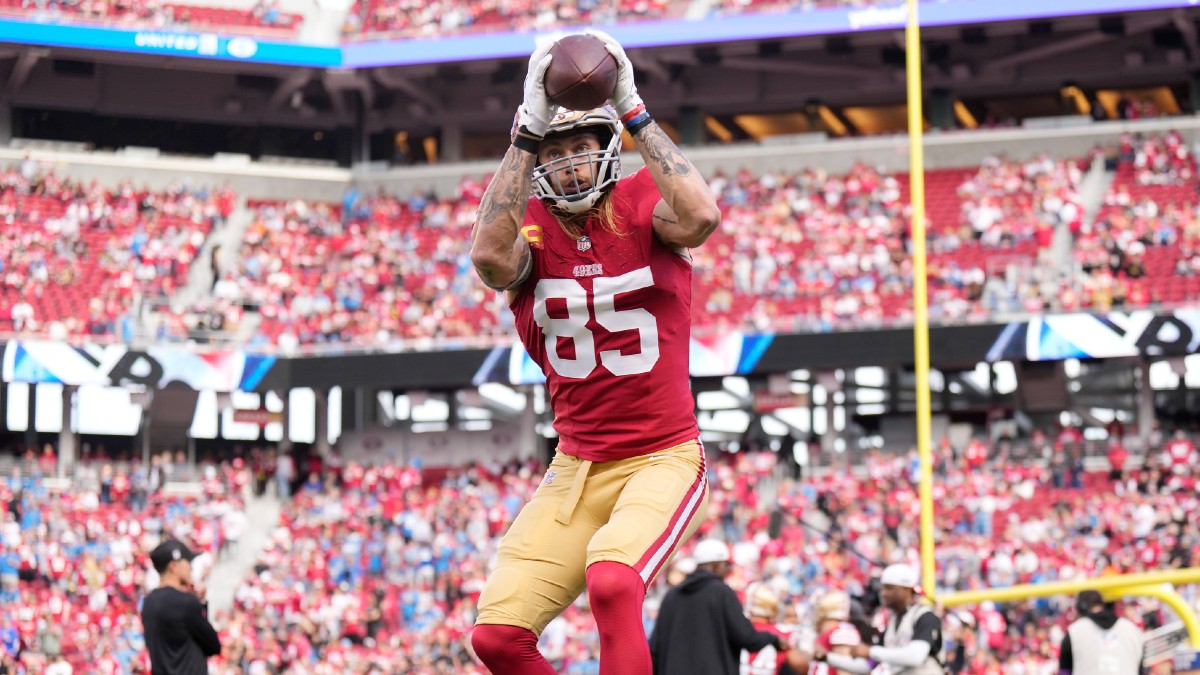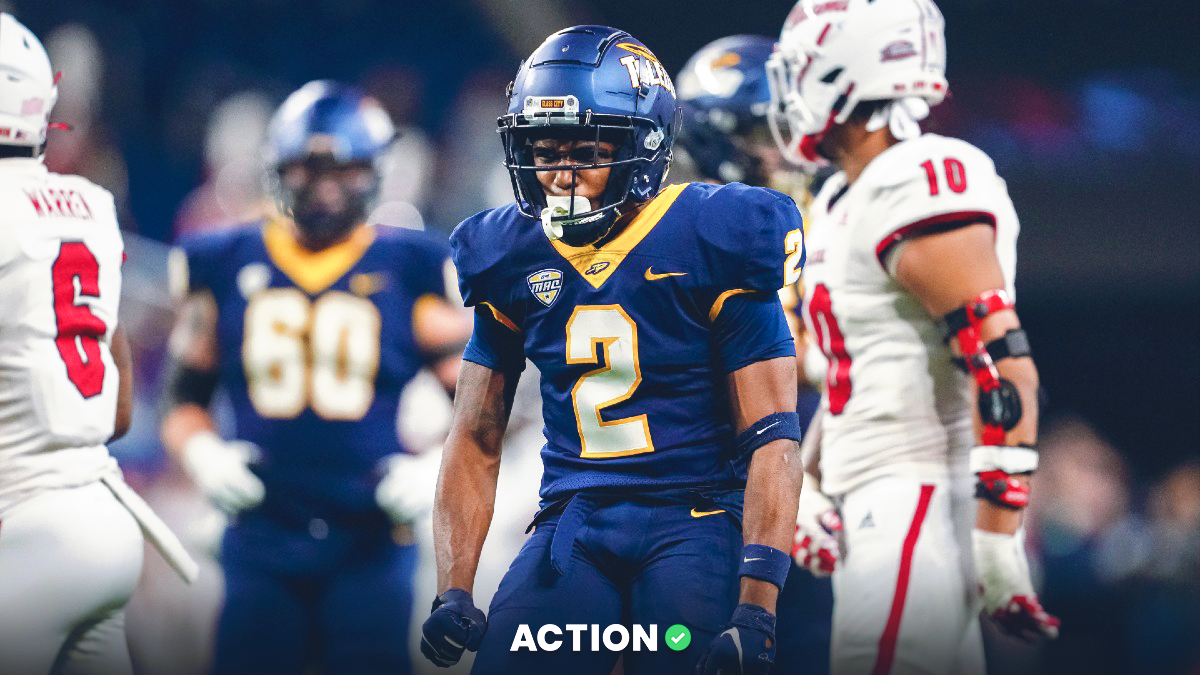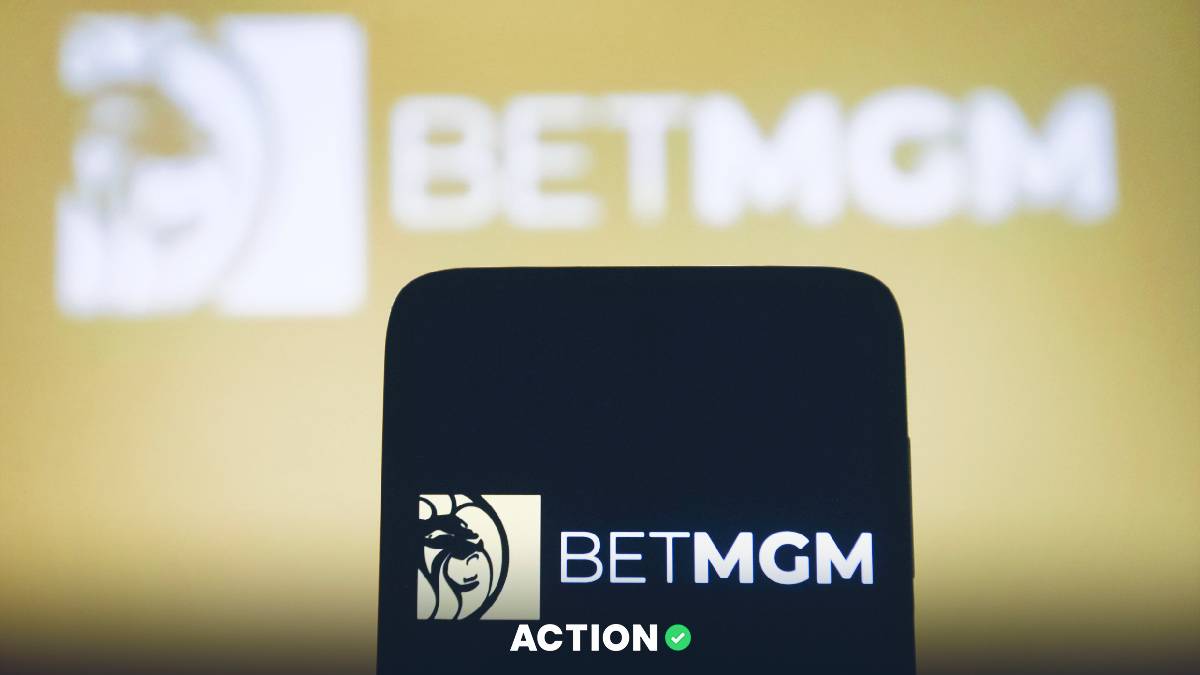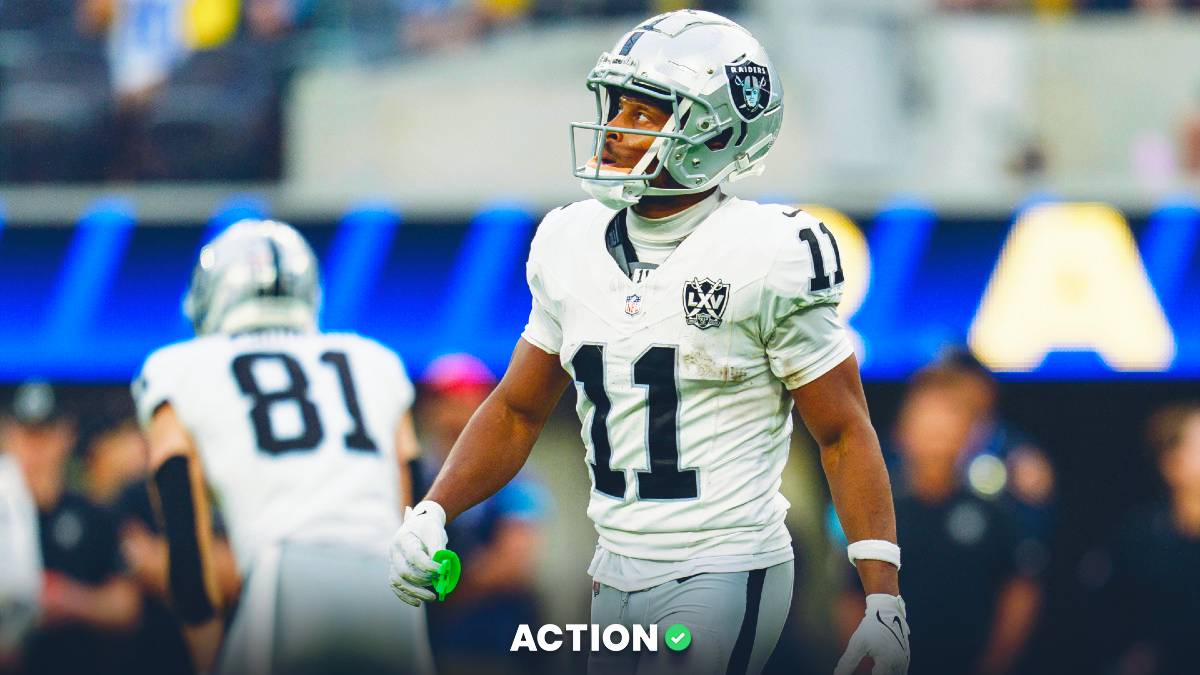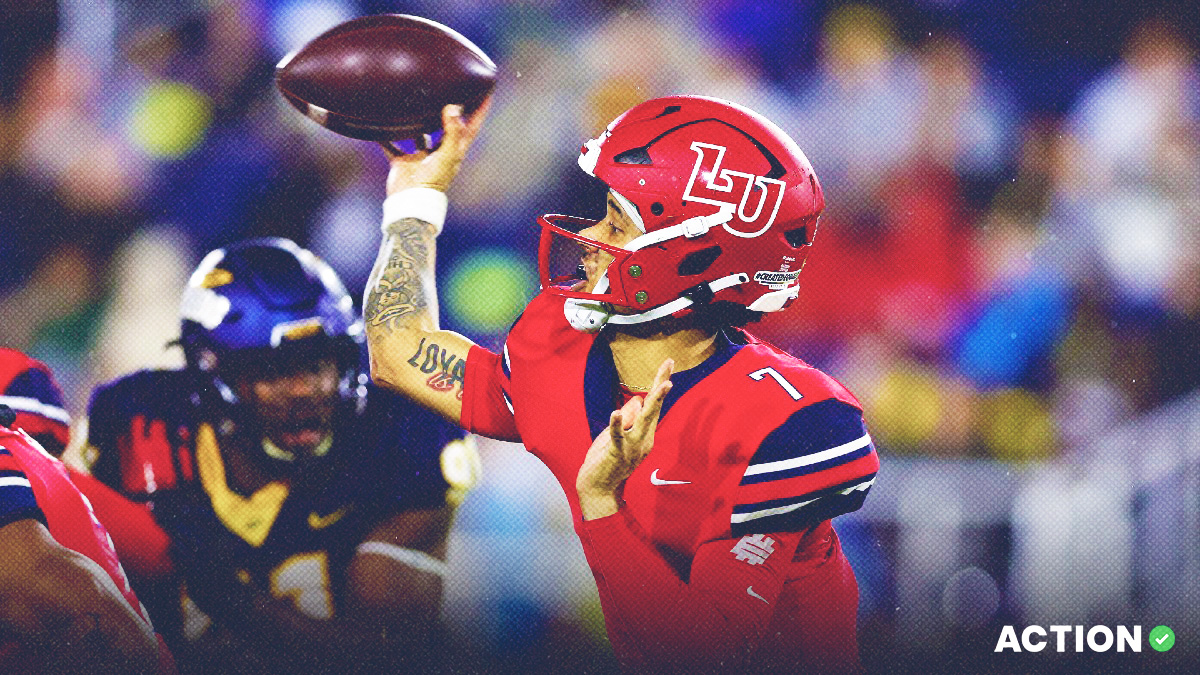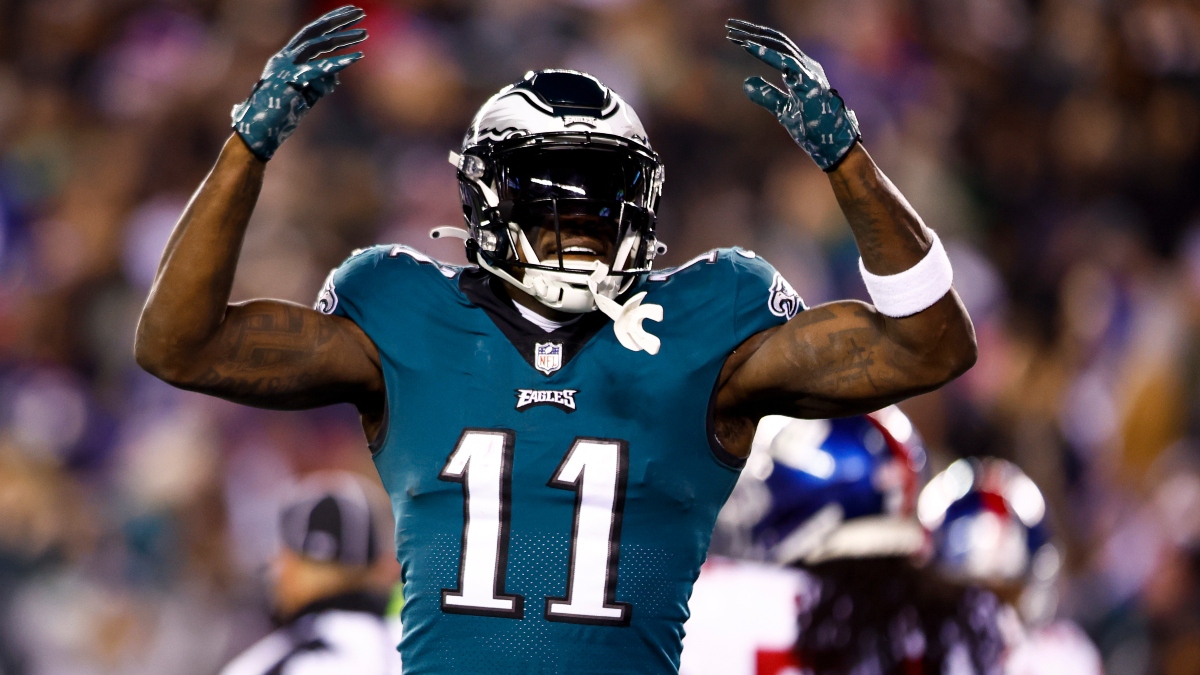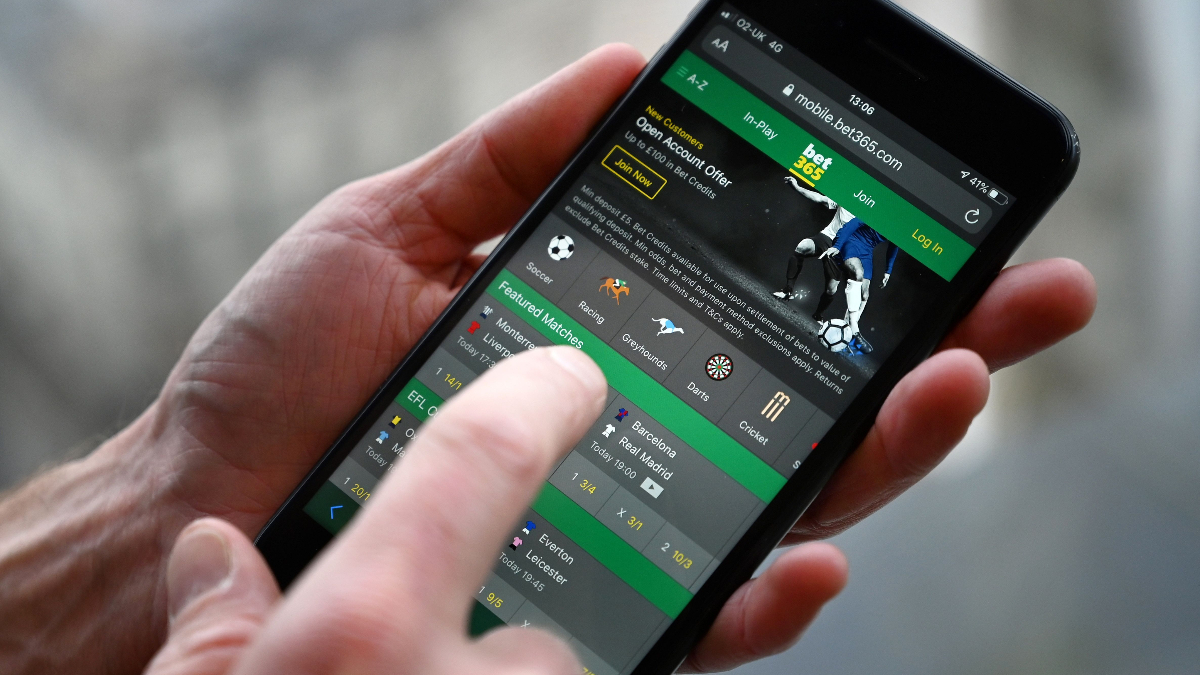Two brand-new sportsbooks launched in New Jersey at the start of the NFL season. They're interesting for a few reasons:
- They're totally different from what's already available in the legal market.
- The fundamental model is the same.
- The executions are very different.
Betting exchanges, Prophet Exchange and Sporttrade, have been trying to launch in New Jersey for more than a year. They finally got live ahead of the 2022 NFL season.
It's been cool to see a startup arms race between two companies with first-time sports betting founders trying to do something very similar, but going about it in a very different way.
I bet on both exchanges over the last few weeks and explain my first reactions below. Full disclosure, Action Network has an affiliate relationship with Prophet, but not Sporttrade.
First, let's dive into what a betting exchange is.
Betting Exchanges, Explained
So what is a betting exchange? It's essentially peer-to-peer wagering, and the house takes a 2% cut on winnings, and nothing on losses. That will lead to massive savings for bettors.
On Thursday Night Football in Week 4 for example, moneylines on Prophet closed at Dolphins +176 and Bengals -180 — both the best in New Jersey. Most other books had around -190/+160.
Because you pay 2%, the lines end up being a little worse — if your +176 winner cashes, it's really more like +173.5.
You can get point spreads at even money, then you pay a 2% commission.
Here's how a $100 moneyline bet looked for Dolphins-Bengals, with the commission included.
Prophet
| Bet | Win $ | Odds |
|---|---|---|
| Dolphins ML | $172.5* | +176 |
| Bengals ML | $54.45* | -180 |
Traditional Sportsbook
| Bet | Win $ | Odds |
|---|---|---|
| Dolphins ML | $160 | +160 |
| Bengals ML | $52.63 | -190 |
*After the commission is taken out
Sounds too good to be true, right? Is there a catch?
Sort of. The perceived hurdle to exchanges working in the U.S. has always been liquidity.
In order to facilitate a peer-to-peer marketplace, there needs to be a buyer and seller on each side of any bet. The house isn't actually taking any action. And in the U.S., the Wire Act prevents bettors in different states from wagering against each other.
So even if Prophet and Sporttrade operated in 30 states each, Indiana bettors could only wager against Indiana bettors, NJ vs. NJ bettors, etc.
So the question becomes — if you want to bet $5,000 on Dolphins moneyline, will there be someone on the other side to bet against you? We'll find out.
The Different Approaches
While these products attempt to offer a similar value prop — the best prices in the industry — they went about achieving it in completely different ways.
They both take 2% commissions on winning bets, but the similarities mostly end there.
Sporttrade's Approach
Sporttrade is trying to mimic a stock trading environment, not a sports betting environment. They post everything in probabilities out of 100%, and call them contracts. There really aren't American odds on the platform.
They've also built a network of market-makers — in sports betting, I'd think about them as sharp bettors who are always available to buy or sell a bet — to supply liquidity to the platform, which they believe will be a big advantage. CEO Alex Kane said 95% of the trades are between user and market-maker.
There are two ways you can think about how Sporttrade does its pricing.
- The cost is just a probability. So the Bills at $58 means the market says they have a 58% chance to beat the Chiefs — converted to -138 in American odds. The Chiefs are $43, giving them a 43% chance to win — around +133.
- The second way is that you'll profit the difference out of $100 from whatever you bought the team at. So if the Bills are $58 and you bet exactly $58 on them, you'll profit $42 if they win. If the Chiefs are $43 and you bet $43, you'll win $57.
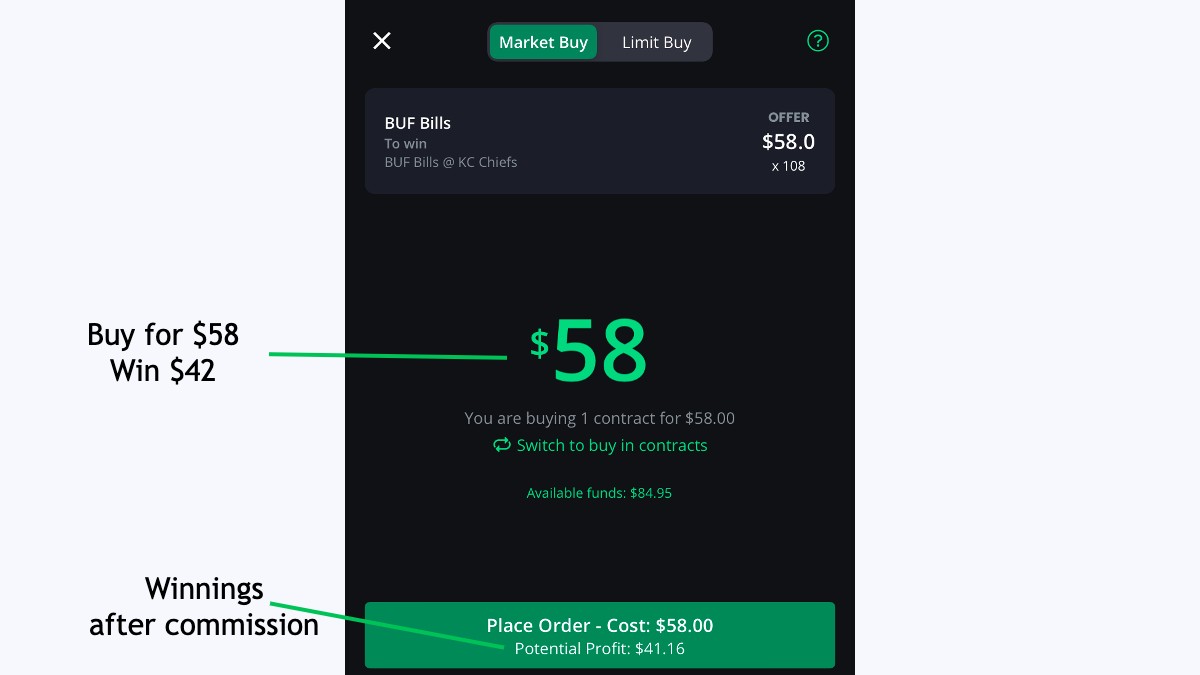
I prefer the first method, because I'm rarely betting such specific amounts on a team. I'm usually flat-betting $50. I'm not going to change my bet size to $58 just to make it even.
The interesting thing about Sporttrade's approach is that it doesn't feel much like sports betting. It feels like day trading, but the things you're trading just happen to be sports.
That was the vision behind the product — Sporttrade wants to be the Robinhood of sports betting.
This was initially a pretty big turnoff for me. I don't come from the financial world. I make a handful of stock trades per year and I've never used Robinhood.
After watching some of their videos and playing around for a few hours, it started to make some more sense. But I almost had to disconnect my sports betting brain.
Normally, my thought process for betting goes like this:
- Find a bet I like
- Find the best price
- Bet it at that sportsbook
With Sporttrade, I found it harder to equate the best line with what was available. Should I bet the Chiefs at $43 at Sporttrade, or +125 at WynnBet? (The answer is Sporttrade in this scenario, even after the commission, because the price is about +129).
I'd get used to doing the calculations off the top of my head if I use the product enough, but I think this will be a hurdle for many existing bettors. While professional bettors think in implied probabilities, I'd venture to guess 98% of existing American bettors are more comfortable with American odds.
Maybe it's a plus for day-traders-turned-sports-bettors, but I'm not sure how many of those there are.
Prophet Approach
Prophet's approach is totally different. It feels like sports betting. And its app is very minimalist (at least for now), which is totally fine.
The company wants to offer the best price in the market on spreads, moneylines and totals. That's it. They don't want to be Robinhood, or mimic trading in any way. It's a sports betting product.
This made it much easier for me to understand from the jump.
I liked Florida State moneyline against Clemson, and Prophet had the best price at +152. Done.
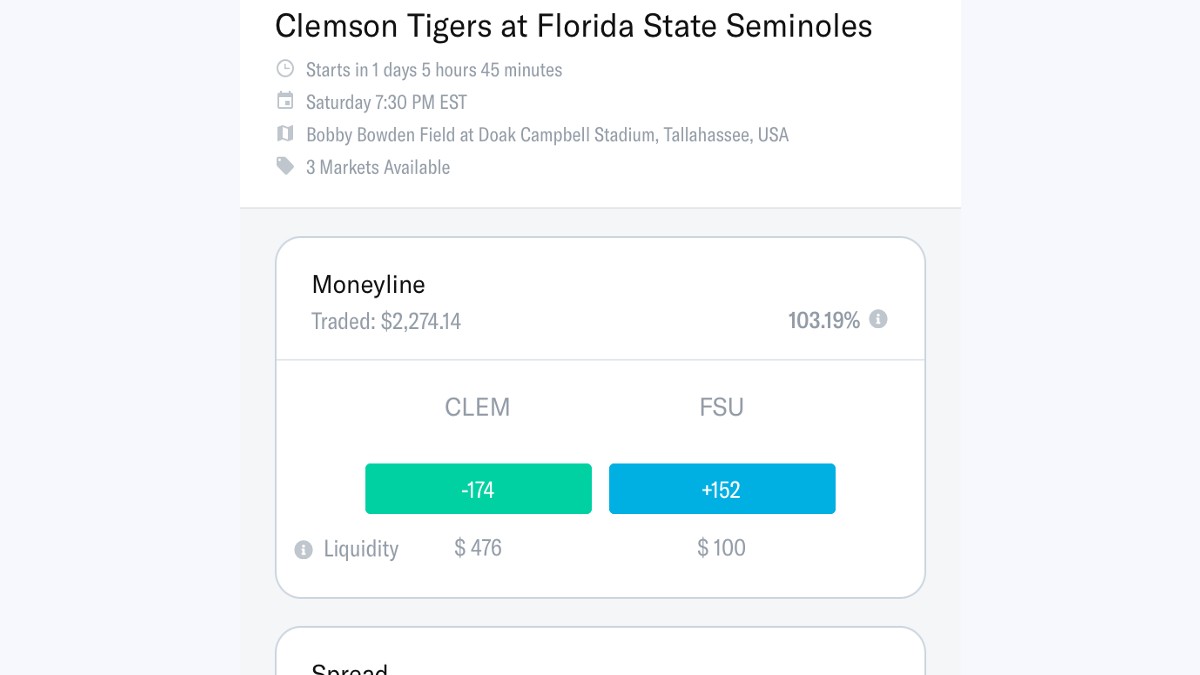
Sporttrade Pros
1. The User Experience: It's clear that Sporttrade invested a lot into the quality of its mobile app. To be the Robinhood of sports betting, you need to provide a clean, easy-to-use interface that doesn't lag. The app is sleek, it works well, and has some cool designs.
2. The Portfolio View & Live Trading: To be the Robinhood of sports betting, you need to provide a user experience that makes betting seem like investing. That's what Sporttrade did with its Portfolio tab. Both the product and execution make for a cool live betting experience.
Instead of a "pending bets" view, it gives you real-time looks into how the prices of your bets are changing.
The market-makers we referenced above are trading every game live, so you can always find a way in or out of a bet during the game with zero delays or lag time.
I made these $5 bets in Guardians–Yankees Game 2:
- Guardians moneyline
- Guardians+4.5
- Over 6.5
- Under 8.5
After New York went up 2-0 in the bottom of the first, my positions had gotten worse, except over 6.5. Because the live total was trading higher, it had gone up in value.
The others were now less likely than they were pregame, and the market-makers had adjusted the prices.
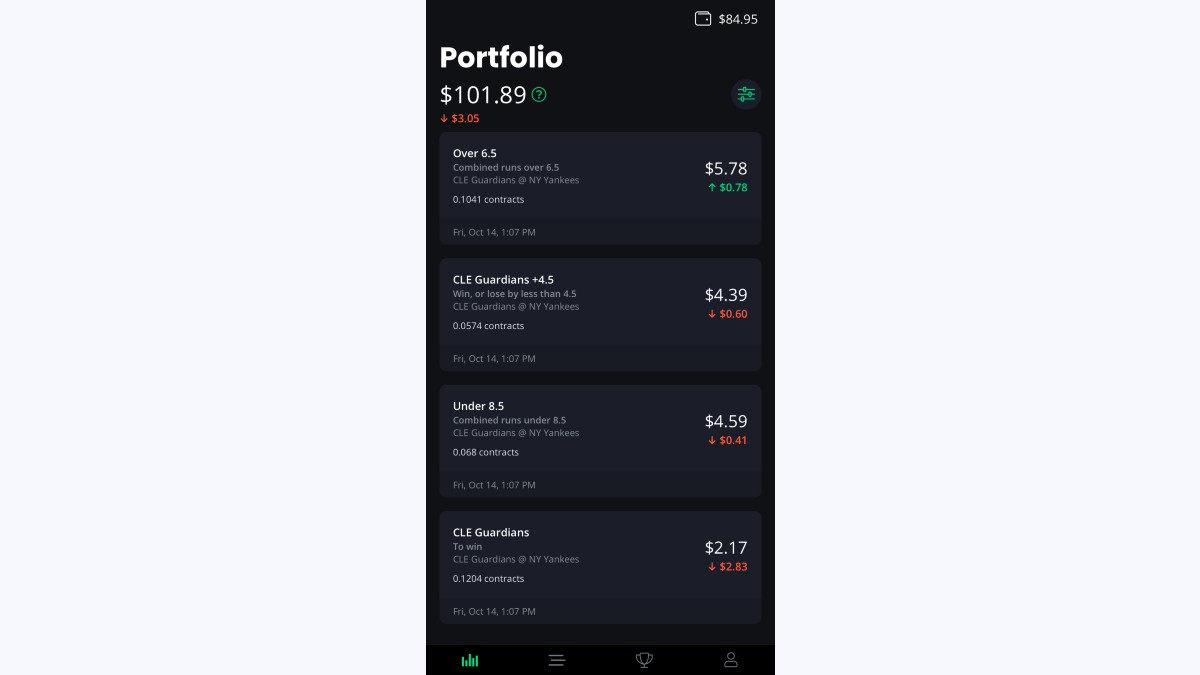
Then after the Guardians escaped the second inning after putting a few runners on base, I sold my under 8.5 bet at a small loss. I'm now down to three bets.
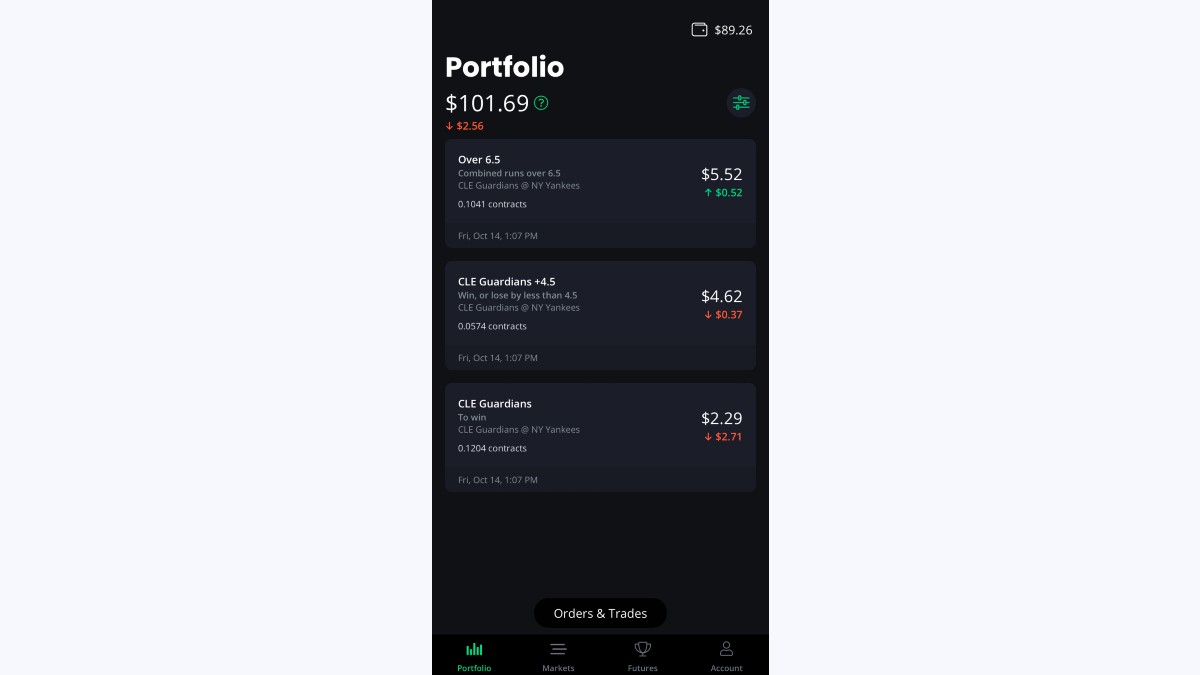
This is especially nice during a busy window of live games, where things are changing so quickly. You can sell your positions easily.
After the Guardians came back and won, my portfolio of course went up in value.
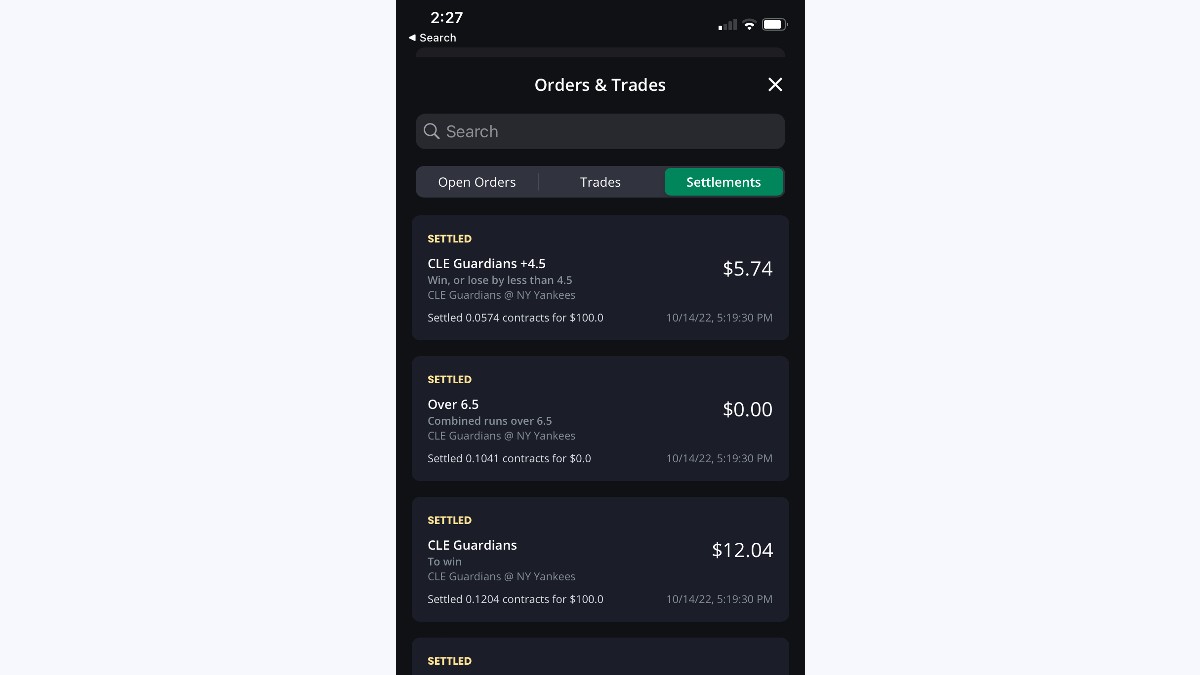
Even though the contracts are a bit confusing to me, the live trading experience is cool. And they've clearly done the leg work to make sure there is always someone for users to trade against.
The percentages and contracts make more sense when you see your bets gaining and losing value as you watch the game.
Prophet also has very little live trading liquidity right now from what I've followed, so Sporttrade has a big edge here.
3. More Markets: Sporttrade offers a few additional bet types, like golf outrights and title futures like the Super Bowl winner and the NBA title winner.
The cool thing about markets like this is you can take the "no" side of a longshot future. They call it the "sell" side.
For example, if I want to bet that the LA Clippers will not win the NBA title, I can "sell" a contract for $12. That means $88 wins about $12.
That effectively means I'm betting -750 that LA won't win it all. You need to have pretty deep pockets to bet these consistently, but it's nice to have the option. Almost every other sportsbook makes these one-way markets, allowing them to price them wherever they want with no repercussions.
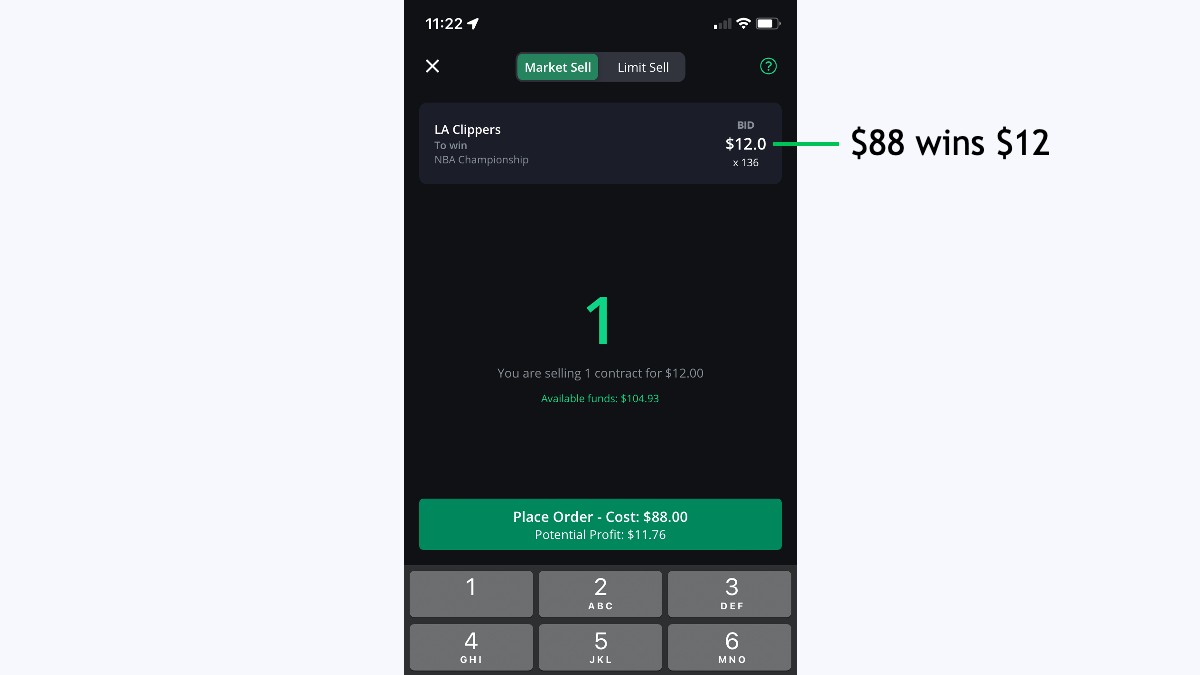
Sporttrade Cons
1.The lines stay the same: Sporttrade posts its own spreads and totals, and then the market moves the vig around it, in line with movement elsewhere in the betting market.
Prophet on the other hand allows you to post your own spreads and totals, though they most likely won't get filled unless they're the best price available.
For example: the Giants–Ravens total was listed at 44.5 earlier in the week at Sporttrade. Other sportsbooks eventually moved to 45 and 45.5.
So market-makers move the vig around the total of 44.5 at Sporttrade, to be more in line with what other sportsbooks have done.
That creates the following market:
| Bet | Odds | Profit |
|---|---|---|
| Over 44.5 | -115.5* | $86.73* |
| Under 44.5 | +103.88* | $103.88* |
*Implied odds with commission included
Let's say I want to bet $100 on the over.
I now need to decide if I should bet over 44.5 at about -115.5, over 45 at -108 at WynnBet or over 45.5 at -104 at FanDuel.
| Bet | Odds | Profit |
|---|---|---|
| Over 44.5 (Sporttrade) | -113 | $86.73* |
| Over 45 (Wynn) | -108 | $92.59 |
| Over 45.5 (FD) | -104 | $96.15 |
I can use the best odds column on our NFL odds page to see which line is better, but it's tricky to figure out on your own or if you're in a time crunch before a game (the over 45 at -108 is the best, by the way).
You do need to re-train your brain if you come from a sports betting background.
2. Pricing in contracts: As I just noted, I don't think the "sports betting as investing" concept is for me. Sporttrade clearly executed on its vision, and if the users they believe are out there are really out there, they will succeed.
I've had too hard of a time equating contracts to odds. Maybe it's easier for someone who has never bet sports or looked at American odds to understand right away.
I could also see this format being preferred for actual investors or market-makers betting big money at these exchanges. But again, I am not that person.
That said, the pricing is strong. That's the beauty of the exchange model. Every game is going to have an overround of 0.5% to 1.5%. And as long as there's liquidity, I'll keep money on Sporttrade and continue to bet there.
3. Home Teams Are Listed on Top: On every (American) sports scoreboard, or at any sportsbook, the home team is always listed at the bottom in a matchup view. Sporttrade's is the opposite, which drives me crazy.
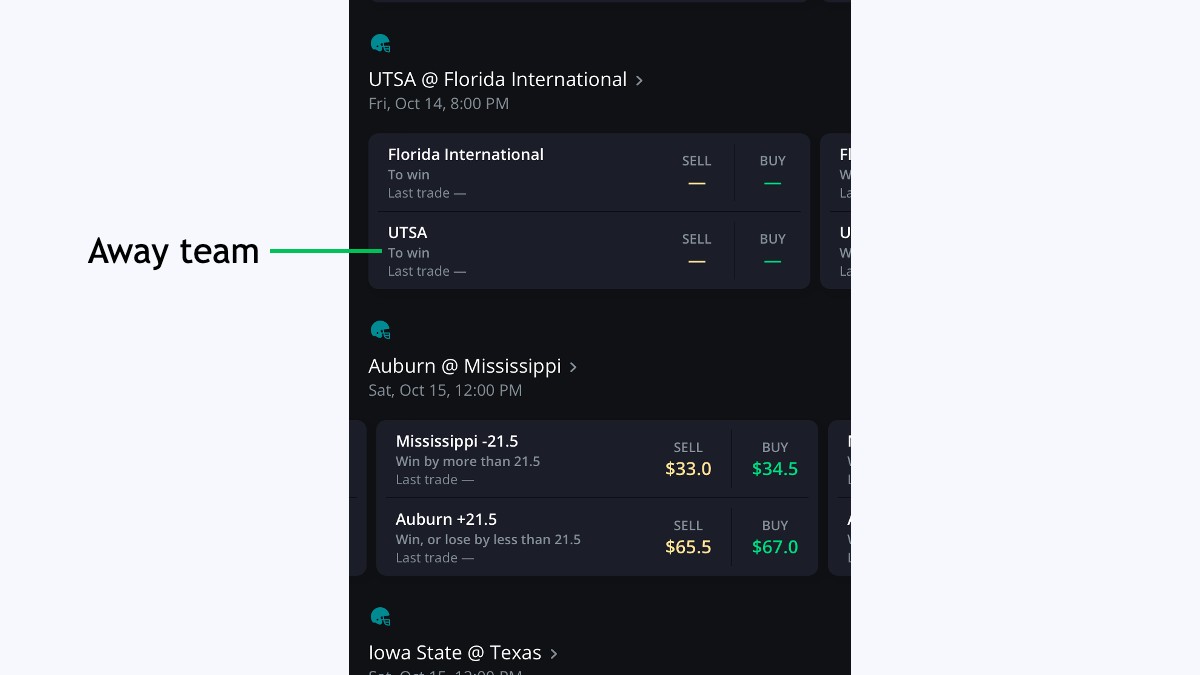
Prophet Pros
1. The Best Moneyline Prices: On many games in many sports, Prophet will have the best moneyline prices, even after you factor in the 2% commission.
This is the biggest pro or con of either site. With 30+ sportsbooks in NJ, you need Prophet as a major part of your rotation if you care about price. It's a clear differentiator. Sporttrade also has strong pricing, but it's not as apparent when comparing it to the rest of the market — i.e. is Chiefs at $43 better than Chiefs +130?
The exchange model allows bettors to create such tight overrounds — the implied percentages over 100%, which shows you how strong the overall pricing is. (So if you had two lines at +100, each are 50%, and the overround would be 0% because they add up to exactly 100%).
For example, 90 minutes before Yankees vs. Guardians Game 2, this is what the moneylines looked like:
- Guardians +144
- Yankees -148
With the commissions baked in after if you win, the prices would be more like -151 and +141, but those are still just about the best-in-market as of 90 minutes before the game.
2. It Feels Like Sports Betting: With how my brain is wired, I'd prefer to see things in American odds. I want to find a bet to make, find the best price, and bet it.
Prophet is keeping it simple, and banking on price being its main value driver. Sporttrade is trying to re-imagine sports betting entirely.
Prophet Cons
UPDATE: Prophet actually overhauled its spreads and totals to remove this straddle and offer the same number. Here's an updated screenshot.
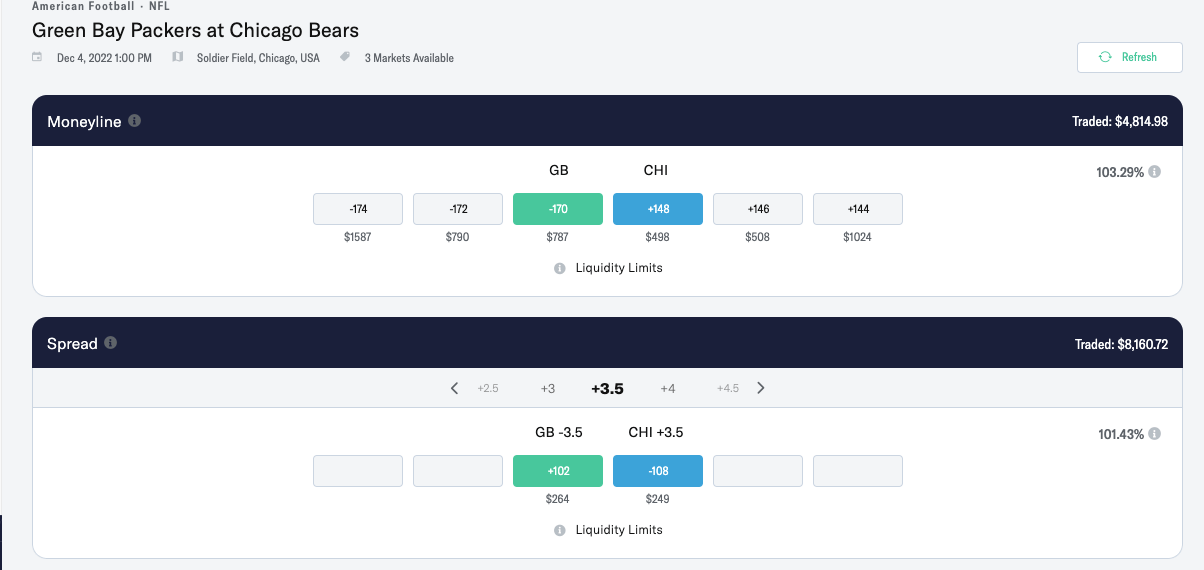
1. The Spread & Total Straddles: Prophet may offer +100 on its spreads and totals, but it never actually has the best spread or total number. Their spreads and totals are always a half-point off, because they take what's called a straddle — so the Bears may be +3.5 but the Packers will be -4.
2. How Commissions Are Displayed: I don't think the commissions are properly displayed or represented in some spots at Prophet.
For example, I bet $60 on the New York Rangers moneyline against the Wild at +128. They won, so I profited $76.80. Then Prophet takes 2% of my winnings, or $1.54.
In my bet history, it says that I won $76.80. I have to go into my "Account Statement" details to see how much commission was actually taken out.
Sporttrade is a little more straightforward, as they list the "potential profit" before you even place the bet with the commission taken out.
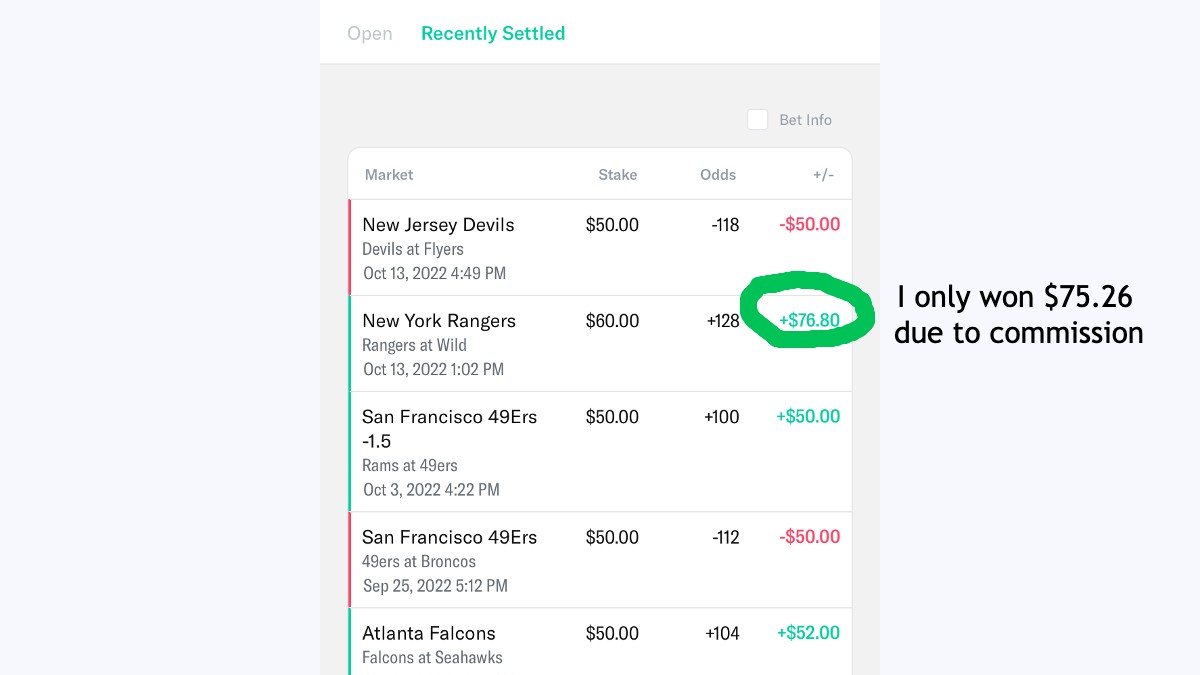
Prophet does only take 2% of your total winnings on a market — so if you bet $100 on the Giants, then $80 on the Ravens, and won $20 total, the commission only comes out of the $20 in winnings. Not the $100 on the Giants.
Conclusion
Sporttrade has a lot of consumer education to do. I spend all day inside sports betting products for a living, and I had a hard time figuring it out at first.
That said, if live betting is your thing, Sporttrade probably already has the best experience in the market.
Prophet's path is a little more straightforward — get enough sports bettors and money on the platform to create a sustainable exchange.
Perhaps Sporttrade will help reinvent and reshape how the sports betting industry thinks and behaves, but I don't believe the broader U.S. market is ready for that yet.
So Prophet is my preferred exchange for now, but I'll still be using Sporttrade as well, particularly in-game.


